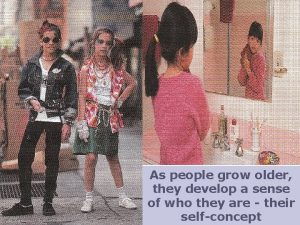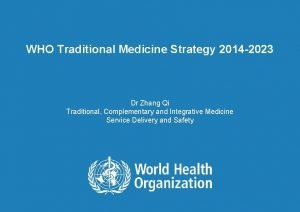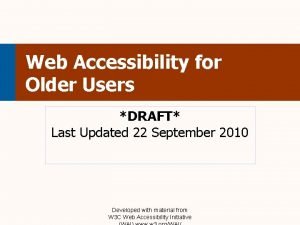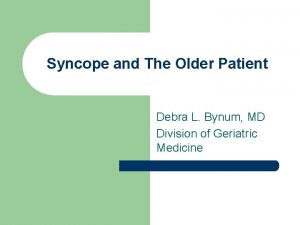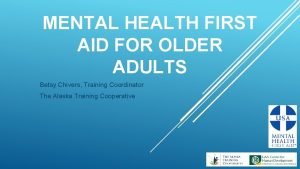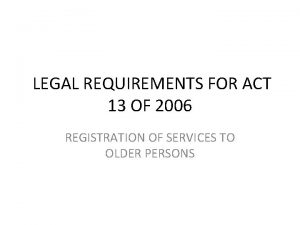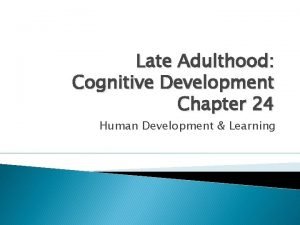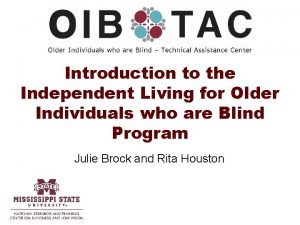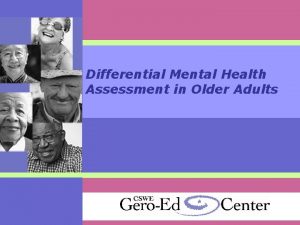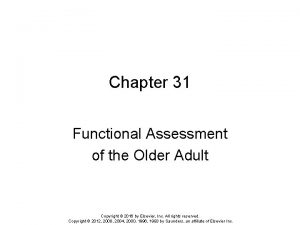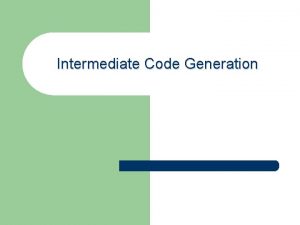Glasgow Integrated Care for Older People Intermediate Care















- Slides: 15

Glasgow Integrated Care for Older People – Intermediate Care

Comparison of Rates of Admission Rates per 100, 000 of Population – Council Area – 2004 – 14. Source ISD

Older people are not heterogeneous • • The fit and well Economically active Volunteers Carers • • The frail/ vulnerable Often women Usually over 80 Multi morbid

Frailty as an abnormal health state A state of vulnerability to poor resolution of homeostasis following a stressor event Clegg, Young, Iliffe, Olde-Rikkert, Rockwood. Frailty in elderly people. Lancet 2013; 381: 752 -762

Reshaping Care for Older People Population changes over time – 2015 – 2037 (22 Years!) Source – Census / General Registration Office Scotland 2014

Where did we come from? • High number of older people in Acute hospitals Ready for Discharge but ‘delayed’ • Older people going to long term care when some could potentially go home • Assessment for future care needs being carried out in crisis and in Acute hospital Environment • Older People being admitted to Acute Hospital Care due to ‘lack of alternatives’

What we had • Direct ordering of homecare by hospital staff in place since 2000 • Small step up unit in NE • Community Rehabilitation Teams with in-reach to A&E, early supported discharge, GP rapid response • Broken relationships/ lack of trust

Planning & Delivery • Small operational group – small quick cycles of change – PDSA- met weekly initially • Representation from Health, Social Work, Independent and Voluntary sector- key to building relationships • Developed based Intermediate Care Model • Introduced a BHAG – 72 hours • Changed practice to be more risk enabling • Involved service users and families and front line staff in service evaluation

Intermediate Care Principles • Professionals should not make decisions about an individuals future care needs while they are in crisis. • Older people should not be assessed for their future care needs in a hospital environment • We should afford an older person the greatest opportunity to remain in / return to their own home

Intermediate Care – Good Practice • We established dedicated units in all Sectors of Glasgow City. • Each unit has dedicated GP Sessions, Rehabilitation and Social Work Staff and access to Consultant Geriatrician Support • We provided training and support to staff in care homes in developing an enabling and rehabilitating ethos • Service focused and targeted with service user at the centrefocused on what we had to achieve- 48 hr goal planning , weekly reviews, outcome focused care planning.

Feedback – service users & family “Following her stay in intermediate care my mum is more improved than she was 6 months ago at home. We feel we have got our mum back “ “They ( hospital)said I’d need to go into care, the fact that I got home to my own bed meant the world to me “ They were great in the unit, I felt people were really interested in helping Mary to become more independent - Mary it’s your turn to make the tea”

Results- People aged 65 plus delayed over 72 Hours Excludes – AWI / Mental Health / Learning Disability from Weekly Report – 2 nd February 2015 to 8 th February 2016

Results Nov 2014 - Feb 2016 SOURCE: EDISON & GCC MONTHLY BALANCED SCORECARD 160 Average Monthly Delayed Discharges of Patients over 65 & Patients going home from Intermediate Care Glasgow City November 2014 - February 2016 140 120 100 80 60 45 40 15 20 1 0 ноя-14 дек-14 янв-15 фев-15 мар-15 >65 Patients Delayed апр-15 май-15 июн-15 июл-15 авг-15 сен-15 окт-15 Patients Going Home from Intermediate Care ноя-15 дек-15 янв-16 фев-16

Emerging Issues • • Relationships Language Readmissions Risk – perception

Continuous Improvement • Early identification of those ‘at risk’ • Need to look at the ‘front door’ to prevent Older People reaching crisis- step down beds • Provide creative and different solutions to allowing and support Older People to remain in their own homesaccommodation based strategy • All partners need to have different conversations with Older People, their families and Carers • On going evaluation and improvement
 Life is older older than the trees
Life is older older than the trees As people grow older
As people grow older Health systems building blocks
Health systems building blocks Primary secondary tertiary care definition
Primary secondary tertiary care definition Web accessibility for older users
Web accessibility for older users Taller stronger sister
Taller stronger sister Syncope in the older patient is
Syncope in the older patient is Which is older
Which is older Mental health and older adults
Mental health and older adults Dq98 form
Dq98 form Intellectual development in later adulthood
Intellectual development in later adulthood Older individuals who are blind program
Older individuals who are blind program Mental health and older adults
Mental health and older adults Altered cognition in older adults is commonly attributed to
Altered cognition in older adults is commonly attributed to Older television sets had tubes
Older television sets had tubes Prodigal son elder brother
Prodigal son elder brother

